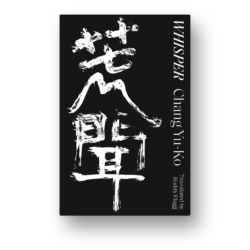Whisper, by Chang Yu-ko
translated by Roddy Flagg
Honford Star, 2021
Publisher's Blurb
Victims all describe hearing a voice before they die gruesomely. Sometimes it’s singing an old
Taiwanese song, sometimes it’s in Japanese, and sometimes it’s an anguished call for help from a loved one. Can Wu Shih-Sheng, a degenerate taxi driver in Taipei, hunt down the source of the voice that killed his wife before he becomes the next victim?
song, sometimes it’s in Japanese, and sometimes it’s an anguished call for help from a loved one. Can Wu Shih-Sheng, a degenerate taxi driver in Taipei, hunt down the source of the voice that killed his wife before he becomes the next victim?
Whisper is a plot-driven, Taiwanese horror story. As well as being a chilling read, Chang Yu-Ko cleverly combines Taiwanese folklore, the Japanese occupation of Taiwan, and the long-term mistreatment of the country’s aboriginal people into a story of how the past can still kill.
Reading Chinese Network Reviews
Reviewed by Bing Wang, 28/12/21
 After I closed this the book, I could not stop crying. This was quite unexpected. It was supposed to be a horror story with the first few pages full of details on a psychiatric ward, with voices coming from nowhere, abandoned taxis and recorders, bodies… nothing sounded ‘sentimental’ when the story began. Reading on, I started to resonate with the characters and the story went beyond horror and more into an exploration of humanities.
After I closed this the book, I could not stop crying. This was quite unexpected. It was supposed to be a horror story with the first few pages full of details on a psychiatric ward, with voices coming from nowhere, abandoned taxis and recorders, bodies… nothing sounded ‘sentimental’ when the story began. Reading on, I started to resonate with the characters and the story went beyond horror and more into an exploration of humanities.
Shih-sheng’s wife Hsiang-ying went mad after hearing a voice coming from nowhere, and she later died in a psychiatric ward. The hospital could not give a reasonable explanation for her death. From an abandoned taxi, Shih-sheng found a recording of a girl’s voice singing either in Taiwanese or Japanese, which led him to Mount Jade to look for the truth. In the meantime, another patient Tsu-tsu, who shared the ward with Hsiang-ying was behaving abnormally. This was noticed by a social worker Jui-yi, who used to help in an indigenous tribe. She was reminded of the monster Moxina described in indigenous tales, and which killed many indigenous people in Mount Jade. Chang’s Whisper (Chinese original: 荒聞) tells a story that spans from Japanese colonial times to the modern day and is not only a spine-chilling horror-story but is also thought-provoking.
Through the careful and skilful characterisation, Chang creates a montage and lets the readers be baffled by these multiple storylines. Thus, the ending can be utterly tasteful when everything is resolved and reconciled. Each storyline has its own mission to enable Chang to wrap many other elements into this well-crafted horror piece. We learn of the struggles of females from the fate of the Kuo sisters. Whether married well or simply, the lives of both Hsiang-ying and Chen-shan end in tragedy as they become the victims of the evil spirit. I personally find the story of Shih-sheng resonates with me greatly even though he is portrayed as a coward and irresponsible for his own life. However, he is not alone and more of an example of many of us living in this contemporary world. He is shamed by his original family while his own family life with Hsiang-ying has gone badly since he lost his old job. Even though Hsiang-ying continues staying by his side, he feels empty and insecure. This may be why he finally plucks up the courage to find Minako, the evil one who killed his wife and tries to burn her to end everything once and for all. This is the only thing left in his life. When he was trapped in the dark Mount Jade and trying to survive despite being pursued by Minako, Chang did not talk too much of his fear but his resilience to seek help. I suddenly felt his determination and love for his wife, his family, and his lost daughter.
Bringing in the narrative of the Taiwan indigenous people may be the key to this novel's success. Although Chang has incorporated quite a bit of the history of Taiwan under the control of the Japanese and the Nationalists, from Jui-yi, the social worker who helped in a Bunan tribe, we get to know more about indigenous people and their views on life. Obviously, Chang still writes with the tone of an outsider, and it still reads like an exoticisation of the indigenous people. However, this could also be an indication of the future direction in terms of increasing the diversity of translated Taiwanese literature.
Chang’s knowledge of the radio waves and folk rituals is intoxicating, and this is well-presented in the novel. This also means the translation of Roddy Flagg is extremely thorough. He must have spent much time pulling out all the details from the original and then working out a way to present them succinctly to an audience that may not understand anything about Taoist rituals and Taiwan folk cultures (myself included). His mission is well-accomplished. Those fun facts woven into the storytelling become the reason why this novel is a page-turner.
Reviewed by Bing Wang
Reviewed by Michelle Deeter, 9/11/21
 Whisper, by Chang Yu-Ko, is a gripping story about family ties and the unexpected power of negative emotions. I hesitate to call it a horror story, because that’s not a genre that I gravitate towards and I really loved this book.
Whisper, by Chang Yu-Ko, is a gripping story about family ties and the unexpected power of negative emotions. I hesitate to call it a horror story, because that’s not a genre that I gravitate towards and I really loved this book.
We mainly deal with two characters in this story. Shih-sheng is an insecure man who hate being a cab driver but does not have the initiative to do anything else. He blames everyone else for his problems and he has “no intention of changing anything or tackling his own weaknesses”. His wife, Hsiang-ying, knows Shih-sheng is a “piece of shit” although she is no angel herself. She is unable to control her anger and fails to maintain relationships with her sister and her daughter. Shih-sheng ran over a pedestrian and had to pay compensation to the victim’s family, saddling him and his wife with debt. Ever since then, they have been struggling to make ends meet.
Hsiang-ying starts hearing voices but she exits the doctor’s office when he suggests a referral to the psychiatric department. Things go from bad to worse when Hsiang-ying has visions of her daughter leading her to a bamboo forest where they meet Minako. Minako seems pitiful at first, but then Hsiang-ying realizes that Minako is going to kill her. Still enthralled by the vision, Hsiang-ying falls off a balcony and sustains serious injuries.
Meanwhile, Shih-sheng discovers a cassette recorder in an abandoned taxi. The raspy voice on the tape talks about a girl named Minako, but none of it makes sense. Shih-sheng tries to get help from his taxi driver friends but they’re no use. In the end, he has to go on this journey of discovery himself.
One of the strengths of this book is a deep cast of fully-fledged characters. Hsiang-ying has a rich sister and Shih-sheng has an obedient brother, providing foils for our two embittered main characters. We also learn about a dedicated social worker named Jui-yi, an indigenous woman named Tsu-tsu, and a terrifying Taoist priestess. These characters present theories about why these voices are appearing to Hsiang-ying. As an added bonus, readers get a break from waste-of-space human being Shih-sheng.
The translation was beautiful and I cherished the vivid imagery. My hat goes off to the translator, Roddy Flagg, for making this story so deeply engaging. Phrases like “standing flag-pole straight” and “twisting like sheep guts” brought a smile to my face. I also like that we get the details like the exact brand of cigarettes Shih-sheng smokes and the type of car Shih-sheng drives, just because it roots the story in a specific time and place.
There were just a few places where I think the Chinese needed to be unpacked a little bit. It took me two or three attempts to understand what Hsiang-ying’s main job was, because she went from being a cleaner to being in a department store to spilling hot liquid on someone all in the span of two paragraphs. Taking an extra sentence to describe the food court and make sure that the reader understood the food court was part of the department store where Hsiang-ying works would have been worthwhile. Especially since she moonlights at a restaurant, but she happens to have the accident at her main job in a department store. Maybe reordering the information would have made it easier to comprehend.
I spent most of the book thinking that Ting-ting was dead, and it’s possible that the author wanted that ambiguity at the start of the book so I think the source text correctly conveyed the meaning. Still, as a reader. I felt cheated in an explanation about Ting-ting’s relationship with her parents. The reader does not hear from Ting-ting directly, and every piece of information given from Hsiang-ying and Shih-sheng’s perspective is hazy. Why was Ting-ting so estranged from her parents? Was there anything here that could be unpacked, or if the author was reachable, could a little bit of explanation be provided for the translated version, so the story would have a more satisfying ending?
Overall it’s a great book, perfect for someone looking for a good scare or someone who wants to read about dysfunctional families. I’m interested in reading more from this author.
Reviewed by Michelle Deeter
Reviewed by Roseanna Sonnenberg, 5/11/21
 From the first page of Chang Yu-Ko’s Whisper, I knew I was going to enjoy the novel. The story begins in Wu Shih-sheng’s shack, the writing conjuring up images of cockroaches, empty beer cans, cigarettes and an angry middle aged taxi driver, who wakes up with a hangover, sometime in the late morning or early afternoon. In stark contrast, the story ends with the same man and shack, both now clean and tidy. Shih-sheng doesn’t drink or smoke; he’s not angry; it’s early morning and he’s even been for a jog before work.
From the first page of Chang Yu-Ko’s Whisper, I knew I was going to enjoy the novel. The story begins in Wu Shih-sheng’s shack, the writing conjuring up images of cockroaches, empty beer cans, cigarettes and an angry middle aged taxi driver, who wakes up with a hangover, sometime in the late morning or early afternoon. In stark contrast, the story ends with the same man and shack, both now clean and tidy. Shih-sheng doesn’t drink or smoke; he’s not angry; it’s early morning and he’s even been for a jog before work.
How did this happen?
We are taken on a page-turning journey, following Shih-sheng as he solves the mystery of how his wife, Kuo Hsiang-ying, really dies. Did she have a mental illness and kill herself, or did she die at the hands of a ghost?
I feel that this story has many dimensions, which make it a rich read. This is made all the more engaging by Roddy Flagg’s sleek translation of the novel.
First, it is a ghost story. Shih-sheng travels to Jade Mountain, a five hour drive from his home in Taipei, where he tracks ‘Minako’, in the hope to destroy her before she kills both him and his daughter Ting-ting. She is a terrifying evil ghost: human, yet also ‘screeching’ and ‘insectile’. Equally alarming, the reader meets Kuo Chen-shan – Shih-sheng’s sister-in-law. Whilst Shih-sheng’s life eventually takes a better turn, Chen-shan’s life twists disastrously. Hatred takes seed in her heart; she pays a priestess a visit; she encounters a demon. There is much dark magic afoot...
Different types of ghosts are revealed to us during the story, largely thanks to Hu Jui-yi (Hsiang-ying’s hospital social worker). She re-reads extracts from books about travels in Jade Mountain and researches old news stories about mysterious disappearances, to try and make sense of what has happened to Hsiang-ying and Tsu-tsu (a Bunan patient). Along with her supportive husband and his chance meeting with Shih-sheng’s father (Wu Chen-chien), answers are cleverly revealed and the strands of the plot are perfectly tied together.
As well as being a ghost story, the novel is also thought-provoking in that it shows us how people feel about themselves – and what is truly important in life. Chen-shan, for example, appears to have it all: a husband with a postgraduate degree in charge of a substantial business; great wealth; a Birkin bag; beautiful apartments in Taipei and Beijing. However, her life unravels once she discovers her husband is not as she thought. Her reality becomes one in which she is an unhappy shell of a woman and her material possessions provide no consolation.
Shih-sheng, on the other hand, appears to have little. For example, he isn’t in contact with his daughter; he hasn’t visited his father since he got laid off from work with an electronics importer. He’s now in debt and has lost his small family apartment. His self-worth is defined by social status and he feels he’s worth nothing in the life he leads now. However, in contrast to his sister-in-law, he comes to realise there is more to life than money and a managerial job. He begins to value what he does have; reconnects with family; begins to feel good about himself and ultimately finds peace in his heart.
Another important dimension to Whisper, is the history of Taiwan it reveals to the reader. Through the character of Chen-chien, we get an insight into how life was in the 1930s when Taiwan was a Japanese colony. The past also comes back to haunt the present and won’t be forgotten. This we see, for example, when Shih-sheng witnesses headless soldiers being defeated by ghost tribesmen – a reference to the Musha Incident. The Bunan people are also a pivotal part of the story. We get a glimpse of life as it would have been lived in the mountains; plus Jui-yi’s social work and general knowledge of the Bunan also highlights aspects of language, beliefs and what life is like today.
Radio is also key to this Taiwanese story – a country well-known for its electronics manufacturing industry. In the novel, the radio is an essential link between the present and the past as it is a way in which ghosts can communicate with the living. Secondly, the radio is a glue that holds Shih-sheng’s family together: it is a shared interest with many old memories. And finally, Jui-yi’s research into radios during the 1930s shows us what a change it all made to life in Taipei at that time in Taiwan’s history.
Overall, this is a very accomplished novel that I would highly recommend. To me, it is much more than a ghost story. Its dimensions cleverly tie many aspects of life together, presenting a richly painted Taiwanese picture.
Reviewed by Roseanna Sonnenberg
Reviewed by Ruth Matanda, 3/11/21
 Whisper by Chang Yu-Ko effortlessly blends folklore, time, nature and colonialism into a chilling thriller that incorporates elements of horror. In this book, Chang prompts the readers to question, what if the past were able to physically transcend through space and time and kill?
Whisper by Chang Yu-Ko effortlessly blends folklore, time, nature and colonialism into a chilling thriller that incorporates elements of horror. In this book, Chang prompts the readers to question, what if the past were able to physically transcend through space and time and kill?
The story centres on the lives of Shih Sheng, a formerly wealthy manufacturer who due to the financial crisis has been rendered to driving taxis, living in a slum with his wife, Hsiang Ying, a cleaner who racks up a large amount of debt after an incident at work, caused by the supernatural, leaves a young woman disfigured.
Chang Yu-Kuo creates a world in which human emotions are given the power to create and allow the human to interact with the supernatural, these emotions being fear and hatred.
Fear has the power to change perception and reality, leading to death as Shih Sheng’s wife, Hsiang Ying is plagued by hallucinations of a young Japanese girl which leads to her unnatural death caused by intense fear. Hatred is also an emotion when possessed in excess can birth malicious spirits as in the case of Hsiang Ying’s sister who consults the help of a priestess to perform a love spell but as you’d imagine, it does not go as intended.
Chang does a superb job of using these emotions to show how our belief in and our fear of the supernatural can give these other worldly beings power and sustain their existence, the supernatural exists because of humans belief in it and our fear of it.
Other than emotions, Chang also utilises time and the idea of fate in an interesting way. Events that may seemingly have no connection to each other are all linked in some way and thus so are the characters. Chang borrows elements of Japanese shinto believes such as Kami to expand on the idea of time and space being fluid and yet bound by certain laws, considering that the War world II occupation of Taiwan is the root the events which unfold, it’s unsurprising that elements of Japanese culture make their way into the novel. The past, present and to an extent the future are all connected by events beyond our understanding but must all be faced at once; the wounds of the past can only be remedied by confronting it, acknowledging the injustices committed and rectifying things in the present to prevent further harm in the future..
Whisper doesn’t only borrow from Japanese religious belief but also incorporates some aspects of traditional folk beliefs of Taiwan’s indigenous communities and explores the treatment of indigenous Taiwanese people. Chang does a great job of tying it back to the Japanese occupation of Taiwan exploring the legacy of colonialism and how it still affects the indigenous communities of the island.
Whilst I enjoyed the book, I will admit that the ending left me feeling a little underwhelmed. I think that Chang Yu Ko does a splendid job of setting up the characters, building tension and creating just the right amount of suspense and mystery to keep you reading, however, the ending felt a little disconnected from the tone of the overall book leaving me unsatisfied. Nevertheless, Whisper is still a solid piece of work which will surely leave readers at the edge of their seat.
Reviewed by Ruth Matanda
Reviewed by Tamara McCombe, 10/10/21
 If ideas of paranormal activities gives you unpleasant shivers or your active imagination has you seeing things after watching horror movies don’t open the cover of Chang Yu-ko’s Whisper. This is a haunted tale where priestesses, spirits and those living in modern Taiwan converse and battle.
If ideas of paranormal activities gives you unpleasant shivers or your active imagination has you seeing things after watching horror movies don’t open the cover of Chang Yu-ko’s Whisper. This is a haunted tale where priestesses, spirits and those living in modern Taiwan converse and battle.
Set in near past Taiwan, Chang wastes no time whisking the reader into a heart-pounding account of the living who hear malevolent voices and experience destructive hallucinations of a Japanese girl. Not only is this a peering through fingers read, Whisper also brings to relief sensitive topics such as the mistreatment of indigenous Taiwanese People, the legacy of World War II Japanese presence and the dichotomy of belief in traditional spirits, ritual and medicine by a population underpinned by science and technology. Both those already acquainted and those not with modern Taiwan will find this novel equally appealing. Readers who liked Yan Lianke’s ‘Marrow’ and admirers of Japanese horror movies will likely be fans of this short book.
Within this horror story are two major themes, money and powerful women, which are inextricably linked.
Taxi driver Wu Shi-sheng and his cleaner wife Kuo Hsiang-ying toil to pay off the compensation resulting from when Shi-sheng crashed into a pedestrian. This stress, alongside the loss of face of turning to taxis after losing his job in manufacturing, drives Shi-sheng to drink, cigarettes and women. In contrast, Hsiang-Ying’s frugalness and her wealthy sister’s accounting shrewdness, the reason behind her husband’s successful business and acceptance into his family, portrays women as the financial stability and business cunning of the present society. This argument is enforced by the priestess who elicits fortunes, with no refunds, from all in social strata for her services to ward off and banish evil spirits. While we read of money’s pursuit we watch the characters become, unconsciously, spiritually poorer. Only at the end do we discover if any of them awake in time to save themselves.
Chang was a clinical physician before his first screen script and then novel saw him labelled a rising Taiwanese author. No wonder his hospital descriptions and gruesome bodily depictions read as vividly as though watching the story through a camera. It also places him well to bring up the ethical concerns behind traditional medicine raised during the story.
For an acclaimed script writer Chang strikes a better balance of description and dialogue than many others before him who have tried spanning genres. This literary start from Chang shows potential of building fans across the globe.
Reviewed by Tamara McCombe
